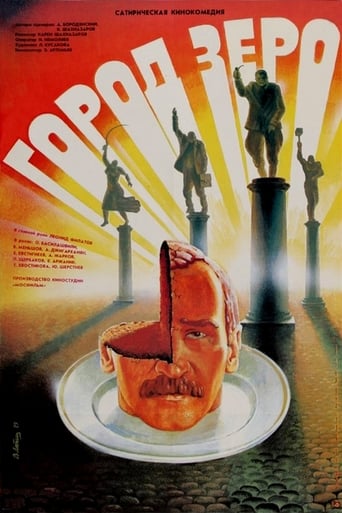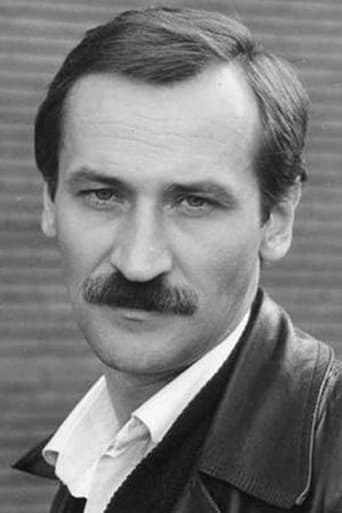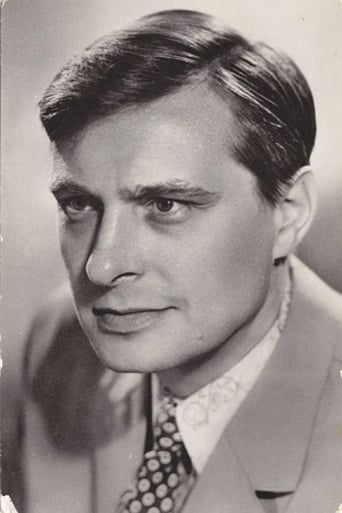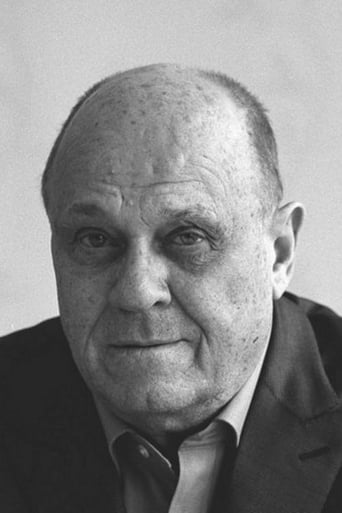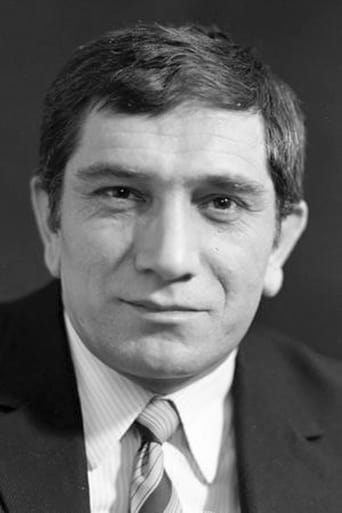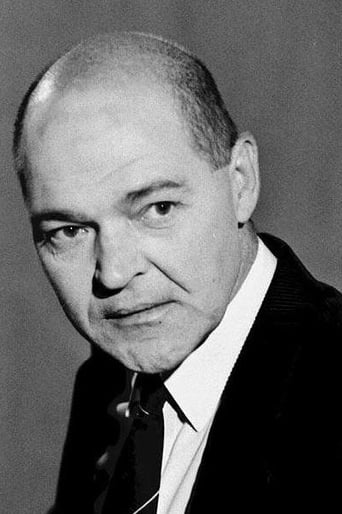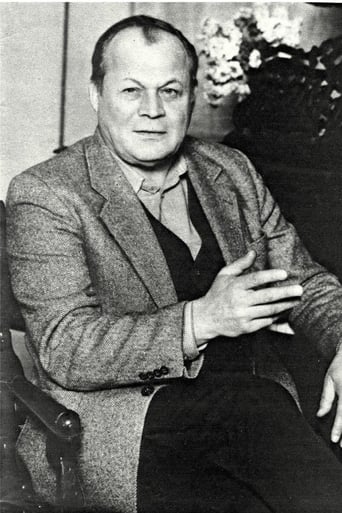PiraBit
if their story seems completely bonkers, almost like a feverish work of fiction, you ain't heard nothing yet.
Bergorks
If you like to be scared, if you like to laugh, and if you like to learn a thing or two at the movies, this absolutely cannot be missed.
Benas Mcloughlin
Worth seeing just to witness how winsome it is.
Roxie
The thing I enjoyed most about the film is the fact that it doesn't shy away from being a super-sized-cliche;
maltian
This movie is a fable of our life - we eventually - every single of us - few exceptions happen, arrive to unknown place and get trapped there to never - most of us break free. And the rest of our life we spend watching without any disbelief at idiocy and absurd around us and abandoning any hope to take a train to Moscow. This movie is Checkov's Cherry Orchard retold in today's words with memory of absurd history of XX cent. So sweet for a Western heart explanation of Soviet system as "oppressive communist regime" has nothing to do with reality - oppression was not coming from KGB, it was in the hopeless idiotism, status quo, absolute stagnation. Sci Fi experiment, the one word which describes the life in USSR is "boring". We know that without sensory inputs, deprived of them our brain starts to generate illusions. This is what you see in this "movie", I put it in commas because for me it is not a fiction movie, it is a documentary.
andreygrachev
I was quite surprised to see this another masterpiece from Karen Shahnazarov. This is real fantasy with the good presence of mystics and social criticism. The main character is an ordinary engineer who comes to an obscure town to fix some business questions. But instead of it he faces very gloomy and weird freedom there. The real hymn of irrationality and rock music. This film looks more like a nightmare dream of a narrow-minded person who comes to some other reality and succeeds to go away in the end. One can see some nudity, psycho- violence and questioning here, but the meaning lies beyond the moral standards of that time in in the USSR.
Prokievitch Bazarov
Sitting in a nearly empty hotel dining room, a baffled engineer named Aleksei watches the waiter wheel a dessert cart to his table. "I didn't order dessert," Aleksei says, but this one was custom-made: a cake that stares back at him in the precise size, shape and color of his own head, right down to the lucid, light-blue eyes. Refusing a slice of his own nose, he ignores the waiter's warning that "the chef will kill himself." Bad choice. Even as he heads for the door, Aleksei hears a shot and turns to see the insulted pastry maker keel over right in front of the happily playing band. This is just the start of the absurd intrigue in "City Zero," a deliciously cheerful satire about the legacy of Stalin, personal identity and the political importance of rock-and-roll. Though its plot is Kafkaesque, its setting seems closer to Lewis Carroll's Wonderland than to Moscow. Karen Shakhnazarov, the director and co-writer, establishes a tone that is eerie without being sinister, and goes on to invent a story that is comic and fluent yet full of dangerous turns. Arriving in a small town for a simple business meeting, Aleksei gets off the train from Moscow in beautiful, misty predawn light and total isolation. When he shows up for his meeting, he finds a secretary inexplicably naked at her typewriter, behavior no one else finds strange. He and the film get off to a shaky start here, but the satire is never again so sophomoric, the tone never again so jokey and wrong. Instead, Aleksei is confronted with the twin cake and before long by investigators who wonder about his connection to Nikolayev, the dead chef he had never seen before. Why, for instance, did the chef have a photograph of Aleksei, which was inscribed "To my dear father," and signed "Makhmud"? Aleksei's calm, baffled demeanor in the face of what seems like a town-wide conspiracy sets the film's effective, deadpan tone. He tries to leave, only to be told at the lonely train station that all the tickets to Moscow are sold. He takes a taxi to the next town in search of another train station, and instead finds a museum whose main attractions are a Trojan sarcophagus and a rock-and-roll tribute to the first couple in town who dared dance to "Rock Around the Clock." The dancing hero, then a 27-year-old secret police lieutenant, was Nikolayev. Soon the stranger in town is lured into its ongoing political feud, between those who live in the Stalinist past and those who are desperate to catch up with the present. "The rehabilitation of rock-and-roll is of great political significance," the mayor tells Aleksei. Just pretend you're Makhmud, suggests the friendly president of the writers' association, so the compliant newcomer helps inaugurate the Nikolayev rock-and-roll club, standing on a stage between large photographs of his beloved dead father and of Elvis. This does him no good with the public prosecutor, who believes that Nikolayev was murdered and that rock-and-roll is an American devil that will ruin the country. Mr. Shakhnazarov is a vibrant film maker who keeps introducing new and more troubling characters without letting the film's comic energy slow down. The lithe young woman who danced so infamously with Nikolayev 30 years before (seen in a vivid flashback) shows up at Aleksei's hotel room with her grown son and a tape player. Now sad, heavy and drab, she touchingly wants to dance with Aleksei, who, she says, is so much like Nikolayev he has "kept our ideals alive." Gradually, Aleksei is robbed of his freedom and his identity. Yet even as he struggles to reclaim them he remains a figure of fun, less a symbol of his country than a hapless hero who has fallen down a rabbit hole.In fact, the political allegory of "City Zero" is never as heavy as its Kafkaesque hero and its rock-and-roll feud make it sound. The film works perfectly well as a fast, funny tale of mistaken identity. But it has a resonance beyond its quick wit, for the style shrewdly mirrors the subject. The tone says, "It's only rock-and-roll," but "City Zone" gleefully depicts the innocuous mask political tyranny can wear. City Zero.
suicidea
An unknown little treasure of the Soviet cinema, based on the story of a man sent to a town where nothing seems real. Definitely a feast for lovers of true cinema, while slow at times, is an intriguing, minimalistic piece of work. In fact this slowness, added to the lack of music and dialog at parts, becomes a plus for the film in a strange way. The whole movie has a dreamlike, Eraserhead-ish atmosphere, so slyly given that you often feel like you're watching someone's dream on the screen.I can't help but agree that, as one other reviewer has mentioned, there are quite a number of references to the Soviet way of life of the period, but naturally they may be hard to catch for everyone. Still, this does not detach the audience.Certainly not for fans of hollywood crap, but movie fans who want to see something unique should see Zero City.
